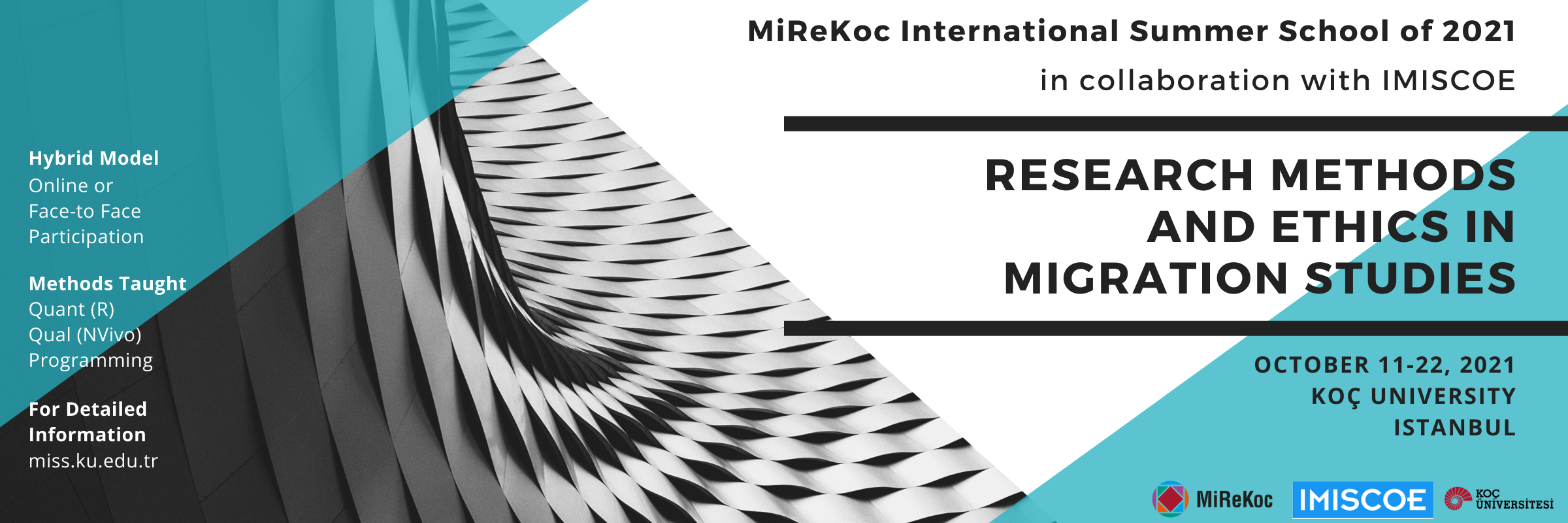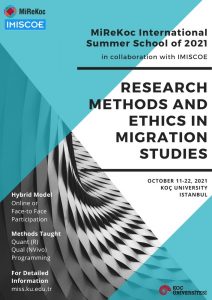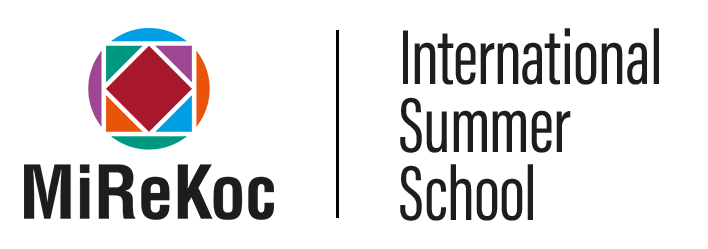
MiReKoc International Summer School 2021
in Collaboration with IMISCOE
Celebrating 10th Anniversary of MiReKoc Summer School
Research Methods and Ethics in Migration Studies
11-22 October 2021, Rumelifeneri Campus, Koç University, İstanbul
The 10th MiReKoc International Summer School will be held in collaboration with IMISCOE, between 11 and 22 October 2021 at Koç University Rumelifeneri Campus in Sarıyer, Istanbul on ‘Research Methods and Ethics in Migration Studies.’
The program of 10th MiReKoc Summer School reflects the importance of methodological debates. Researchers studying migration come from various social science disciplines and may draw on different epistemologies and methods. The rising interest on methods and ethics in migration studies is in the process of establishing migration research methodologies as a diverse field under the overall social science methodologies, considering the quantitative versus qualitative approaches, research ethics, debates about the representation of migrants and refugees, or the role academic research plays in policy making among others. As activist research and other forms of critical engagement flourish; questions about ethics and the relationship between participation and knowledge production are widely debated. Researchers studying migration are influenced by broader engagements in the social sciences including feminist and post-colonial studies; or creative, participatory and forensic methods. Technological advancements and the developments in big data also impact conventional methodological considerations and cutting-edge methods, bringing abstract discussions and practical applications together.
Research methods are associated with power relations and the hierarchization of knowledge production. Scholars seek to address the politicisation of methods in different ways. Researchers rely on and develop methods by recognising the political nature of the migration as an act itself; and also recognise migrant activism in the face of migration policies and politics. Alternatively, and distinctly, other researchers adopt participatory methods to address power relations and positionality; and aim to achieve co- production of knowledge. However, as scholarly debates show, it is necessary to define what is meant by ‘participation’, what form it takes, how does it influence the form of the research product and when does it (if ever) end.
The use of visual methods and the increasing availability of audio-visual material developed by artists and scholars as well as refugees and migrants, raise question about modes of data production, positionality, representation and embodiment. Digital technologies present new sites and practices for exploration necessitating that we ask about how methods are evolving, what possibilities come with access to new types of data and what limitations are researchers currently experiencing. Quantitative methods used in migration studies are especially influenced by technological advances raising questions about methodological innovation and the future of migration research.
In an effort to engage with these diverse issues, the 10th MiReKoc Summer School will focus on methodologies and ethics in migrations studies through various sessions and lectures that bring together international scholars and PhD students working on migration issues. In celebration of the milestone 10th MiReKoc International Summer School, MiReKoc is collaborating and co-branding with IMISCOE. This year’s Summer School includes lectures and sessions exploring different themes focusing on both qualitative and quantitative methods including ethnography, participatory methods, urban mapping, network analysis, big data, visual methods and social media methodologies as well as ethics in migration research to offer a space for scholars and participants to reflect on methodological challenges and opportunities.
MiReKoc Summer School serves as a platform bringing future scholars into dialogue with senior scholars and practitioners from the region and beyond. Past schools have attracted participants from different countries and academic institutions, with participants coming from North and South America, Europe, Africa and Asia. Through its various networks, collaborations and projects, MiReKoc has been able to attract esteemed scholars, researchers, policy makers, and practitioners as lecturers in the Summer School.
The Summer School is designed for PhD and graduate students as well as junior experts in the field. The programme includes two weeks of lectures, lab sessions and discussion sessions which will be led by distinguished international faculty members and experts in the field. The participants will have the chance of sharing their research agendas and ideas with these scholars in an interactive environment. The language of the Summer School is English. The fee for face-to-face participation to the program is 1500 Euros covering lectures, course materials, food and accommodation. The hybrid model offers other alternatives including online participation and for face-to-face participants, an option without accomodation. The fees for each preference changes accordingly and detailed below. Two full scholarships are available on a merit basis for outstanding candidates affiliated with institutions from low-income and lower-middle-income economies according to World Bank list of economies. Some partial scholarships of up to 30% are available for other candidates based on merit and an explanation of their financial constraints. Tuition fee for the students affiliated with institutions from the IMISCOE network will be reduced by 40%. A certificate will be provided upon successful completion of the programme. Additional requirements will be required of those participants who seek course credit.
Lecture Topics Include
• Methodologies on Migration Research: An Overview
• Epistemological and Philosophical Issues on Social Science Research
• Qualitative Methods in Migration Research
• Quantitative Methods in Migration Research
• Mixed Methods in Migration Research
• Experimental Methods in Migration Research
• Comparative Methods in Migration Research
• Ethnography and Participatory Methods in Migration Research
• Urban Mapping in Migration Research
• Gender Aware Analysis in Migration Research
• Network Analysis in Migration Research
• Big Data in Migration Research
• Visual Methods in Migration Research
• Social Media Methodologies in Migration Research
• Ethics of Migration Research on Vulnerable Groups and Sensitive Topics
• Writing and Publishing an Academic Article in Migration Studies
Lab Session Topics Include
- Quantitative Methods:
- Statistical Computing with R
- Qualitative Methods
- Focus Groups
- Discourse Analysis and Framework Methodology with NVivo
MiReKoc Academic Workshops at the Summer School
MiReKoc Academic Workshops at the Summer School provide a platform for participants working towards their doctorate or conducting on-going research to interact with, and learn from, fellow students and top scholars. MiReKoc encourages the participants of the Summer School to become active members of this vibrant and diverse platform. These workshops are designed as a springboard for successful academic careers by examining important issues such as publishing, reviewing, and collaborative research; the event also provides several networking opportunities.
Attendance to the MiReKoc Summer School Academic Workshops are optional. They will be integrated to the Summer School programme, incorporating presentations by the researchers and discussion sessions with renowned academics. The Academic Workshops will enable participants to approach their doctoral dissertations or on-going research with renewed vigour by engaging in discussions on research design and methodologies with colleagues, and by reviewing their dissertation proposals with the help of others, including fellow participants and more senior researchers who work in the respective area of scholarly inquiry.
 When?
When?
11-22 October 2021
Where?
Hybrid Model
Online and Face-to-face Possibility to Join
Koç University, Rumelifeneri Campus, Istanbul
Who can apply?
This program is designed for graduate students and PhD candidates, early career researchers, policy analysts, NGO and international organization practitioners, as well as junior experts in the field. MiReKoc International Summer School does not only offer expanding the knowledge of its participants, but also promises networking opportunities between them and distinguished faculty to enhance both parties’ research agendas. Applications from all over the world are encouraged. The language of the Summer School is English.
How to apply?
Please click here for the application form and send the following documents as a single pdf file to miss@ku.edu.tr and mirekoc@ku.edu.tr:
- A current résumé
- Proof of English: Following are accepted
- TOEFL and/or IELTS scores
- BA, MA or PhD Diploma from an institution whose language of education is in English
- An official letter signed by a relevant authority stating that the language of education is English
- Publication or thesis in English language
- One reference letter from employer or professor: The letter can be submitted by the applicant or separately e-mailed by the referees
- Written work sample: Published or unpublished article, book chapter, thesis chapter and/or report preferably on a related migration topic, if applicable
- A statement of purpose/motivation letter:
- A paragraph on how you will benefit from this summer school. Please clearly indicate your specific developmental needs (e.g., publishing, reviewing, collaborative research, career issues, getting your first job, methods, etc.).
- If you will be applying for a full or a partial scholarship up to 30% based on financial hardships, another paragraph describing your fitness for scholarship.
- If you are interested in participating in the MiReKoc Academic Workshops, incorporating presentations by the researchers and discussion sessions with participants as well as renowned academics, please attach the following documents along with your application:
- Doctoral/academic program including:
- Affiliation
- Main area(s) of studies
- Name(s) of your supervisor(s)
- Stage of your PhD work
- Dissertation/on-going research summary: Description of your doctoral dissertation project (around 3 pages), including a title, a precise research question, theoretical framing, empirical research design and preliminary findings, and references. Your description should also clearly convey how data have been collected/analysed, and concisely indicate the academic field to which the thesis aims to contribute.
- Doctoral/academic program including:
Early application period is extended to GMT on 11 July 2021. Early registrants will be notified in late-July. Deadline for application is midnight GMT on 23 July 2021. The results will be announced in early-August.
Tuition
- The fee for the face-to-face program is 1500 Euros. The fee covers accommodation at Koç University Campus up to 13 nights, all course materials, social activities, three meals a day and coffee breaks on lecture days.
- For the participants who wish to self-arrange their accommodation in Istanbul, the fee is 750 Euros. This fee covers all course materials, social activities, two meals a day (breakfast and lunches) and coffee breaks on lecture days.
- All fee packages cover the expenses of course materials, field trips and social programs.
- The tuition fee for the online participation is 500 Euros.
Scholarships
- Two scholarships will be funded by IMISCOE on a merit basis. Scholarships will cover the tuition, lowest-cost travel to Türkiye and on-campus accommodation and they will be awarded to outstanding candidates affiliated with institutions from low-income and lower-middle-income economies according to World Bank list of economies.
- A limited number of partial scholarships of up to 30% off from the tuition fee will be available for selected candidates. Applicants who wish to apply for a scholarship should indicate their intention in their motivation letter with a short statement of their financial constraints. Please note that this is a non-profit program and the scholarships will be granted based on the availability of funds upon the completion of the application round. Scholarships are not intended for participants who can be funded by their own institutions. It would be appreciated if the applicants can present the unavailability of funds through their institution.
- The fees for the students affiliated with institutions from the IMISCOE network will be reduced by 40%. Please indicate this affiliation in the application form.
Travel
All participants (excluding participants who are awarded scholarship) are kindly requested to organize and cover expenses for their travel to and from İstanbul, as well as their local transportation in İstanbul to Koç University.
Covid-19 Scenario
The MiReKoc International Summer School has 2 scenarios for the October period:
– The first scenario is to continue with the Hybrid model which allows both the possibility for face-to-face and online participation.
– The second scenario involves to continue with the online model in case higher education institutions are being forced to stay closed.
Timetable
Wednesday 14 April – Applications open
Monday 21 June – Deadline for early registration period (10% discount is applicable for early registration)
Sunday 11 July- Extended deadline for early registration period (10% discount is applicable for early registration)
Late-July – Notification to the early applicants
Friday 23 July – Deadline for late registration period
Early-August– Notification to the applicants
Monday 16 August– Deadline for confirmation to attend
Friday 1 October– Deadline for tuition payment
Sunday 10 October– Summer School participants arrive in İstanbul
Monday 11 October– Summer School starts
Friday 22 October– Summer School ends
Other details
- A certificate will be provided upon successful completion of the program.
- Additional requirements including an academic presentation and the submission of an original research paper of at least 7.000 words, will be imposed on those participants who are seeking course credits (3 ECTS).
